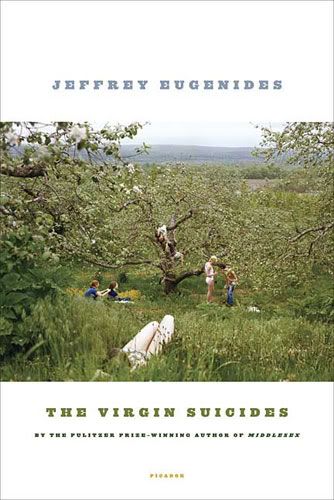
Before I say anything, I'd urge people interested in purchasing the book (or film) to check out all the awesome covers available. The photography and graphics of just about every version of the work are stunning.
Composed of run-on sentences and pieced together in a reporterly manner, The Virgin Suicides is a technical masterpiece. The book tells the story of the Lisbon family living in suburbia, and the suicides of their five daughters Cecelia, Mary, Bonnie, Therese, and Lux. The entire book details the suicides from the viewpoint of the neighborhood boys who are obsessed with the Lisbon sisters as they try unsuccessfully to determine the reasons why the girls took their own lives.
The book makes effective use of rambling description and an investigative manner, piecing together accounts from neighbors, psychologists, and basically any person who came into contact with the Lisbon girls prior to their deaths. The style is what makes the book captivating, however if Jeffrey Eugenides’ goal is to make us fall in love with the Lisbon girls as much as the neighborhood boys are, he fails by a slight margin. The girls are too impersonal, too cold and isolated, and there is no way to sympathize with them; it’s often hard to understand the boys’ obsession with girls who, when they open their mouths, rarely say anything intelligent.
The true satisfaction in reading the book comes in trying to piece together a mystery, but we are told at the end of the book that there is no answer. Surely it’s a true-to-life answer, but a rather disappointing revelation.
The reason the book is captivating to the degree it is is the writing style. Words are juxtaposed in profound manners, paradoxical statements make regular appearances, and the text has a sense of continuous almost stream-of-consciousness feel to it. The novel, while probably meticulously planned, feels fresh and spontaneous. That is its best quality.
-elln

No comments:
Post a Comment